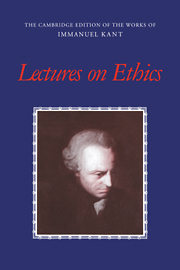Book contents
- Frontmatter
- Contents
- General editors' preface
- Acknowledgments
- Introduction by J. B. Schneewind
- PART I Kant's practical philosophy: Herder's lecture notes (selections)
- PART II Moral Philosophy: Collins's lecture notes
- PART III Morality according to Prof. Kant: Mrongovius's second set of lecture notes (selections)
- PART IV Kant on the metaphysics of morals: Vigilantius's lecture notes
- Select Bibliography
- Explanations of names
- German-English glossary
- English-German glossary
- Name index
- Subject index
PART IV - Kant on the metaphysics of morals: Vigilantius's lecture notes
Published online by Cambridge University Press: 05 May 2013
- Frontmatter
- Contents
- General editors' preface
- Acknowledgments
- Introduction by J. B. Schneewind
- PART I Kant's practical philosophy: Herder's lecture notes (selections)
- PART II Moral Philosophy: Collins's lecture notes
- PART III Morality according to Prof. Kant: Mrongovius's second set of lecture notes (selections)
- PART IV Kant on the metaphysics of morals: Vigilantius's lecture notes
- Select Bibliography
- Explanations of names
- German-English glossary
- English-German glossary
- Name index
- Subject index
Summary
DEFINITION OF THE SUBJECT
§I. Philosophic and even scientific knowledge from rational concepts either has to do with the form of thinking, viz. logic, as the formal part of philosophy, or relates to objects themselves, and the laws under which they stand; the latter constitutes the material part of philosophy, whose objects must reduce absolutely to nature and freedom and their laws, and thus divisible into
a. The philosophy of natural laws, or physics;
b. The philosophy of moral laws.
The former, in a more general sense, might be called physiology, and the latter eleutheriology. But the last-mentioned is actually concerned with developing the Idea of freedom “cf. the treatise on this subject by Prof. Ulrich of Jena, 1788”. Both are based on pure or rational concepts, and hence not only the underlying laws of nature here, but also the moral laws, are founded on principia a priori; whence the two topics constitute that part of philosophy we call metaphysics, in that it assesses them according to pure principles “independent of all experience”, whereas the historical sciences are assessed by empirical, conditioned principles, given in experience.
N.B. The metaphysic of nature is distinct from empirical physics, in that it develops the laws of nature purely a priori, as they exist independently of all experience, and is separated forthwith into the philosophic part, or metaphysic of nature in specie, i.e. that which is concerned with pure rational concepts; whereas the mathematical part at least has corresponding objects of experience as its subject-matter, insofar as it requires the construction of concepts in the imagination.
- Type
- Chapter
- Information
- Lectures on Ethics , pp. 249 - 452Publisher: Cambridge University PressPrint publication year: 1997
- 4
- Cited by



